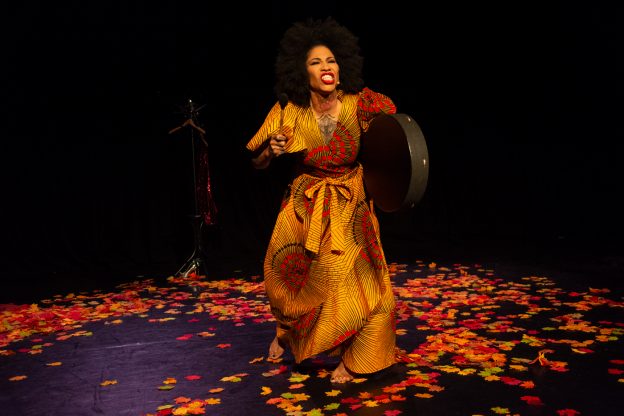Black Sheep, Head Set, Musclebound, and Boy: Four very different shows at the Edinburgh Fringe 2022, from autobiographical solos to docu-theatre, that explore identity and tell true-life stories – as witnessed by Dorothy Max Prior
A Black woman in a boldly patterned dress is sweeping the floor, moving a psychedelic carpet of orange and pink leaves and petals to one side of the space. She bangs a drum, calling out: What are you? Mulatto? Half-caste? What are you? In a different moment, the woman is manipulating a pair of large feathery wings in a seductive fan dance. And in yet another moment, she stands nearly nude, dressed in a flesh-coloured bodysuit and adorned with sticky labels which she peels off and reads out. Each word affirms an aspect of her identity: Black, queer, rainbow, public, private, magnificent… Later in the show, she roller-skates across the stage, handing out ‘Black Lives Matter’ placards for audience members to hold up.
This is Livia Kojo Alour, better known as MisSa Blue, the world-renowned sword-swallower and burlesque/circus performer. All of these splendid images, and many more, flag up different aspects of her-self. Black Sheep, her first solo theatre show, is an exploration of her personal and cultural identity, blending autobiography with a call-to-arms to the audience to ‘Check Your Privilege’ (another of the placards). And indeed, looking around, the vast majority of the audience is, like me, white…
Livia was raised in a safe and secure home in Germany by a white mother, with a grandmother who loved her dearly, but was a former supporter of the Nazi party. Well, plenty of material there to play with! Her relationship with her mother is complex – explored in a lovely, classic physical theatre moment using a coat hanging on a stand and one red glove, the objects animated to create a moving picture of an embracing mother and daughter. They love each other, but Livia feels the need to move on; to create a life in which her Black, queer identity can find its voice.
Black Sheep gives Livia, as a poet and writer, the opportunity to combine her talent for physical performance with her carefully-crafted words, the resulting show an excellent blend of powerful visual images, great poetic text (these poems to be gathered in a collection coming out later this year), and song, as she reworks cabaret classics such as ‘I Put a Spell on You’ – delivered to us as ‘They Put a Spell on Me’, which follows a declaration, repeated throughout the piece, that ‘White people don’t love me for who I am but for who they want me to be’.
Black Sheep, seen in preview the day before the official opening of the Edinburgh Fringe 2022, is one of a number of shows at this year’s Fringe that explore personal identity. Of course, one-person autobiographical shows are a staple of the Fringe – but it is good to see work like this that takes the form beyond the regular autobiographical-confessional mode into new territories. Livia Kojo Alour has been mentored by Marisa Carnesky, whose Showwomen she recently appeared in, and Black Sheep is a similarly sassy blend of cabaret, circus and performance art skills, proving that political theatre needn’t be dull and dirgy. Bravo!
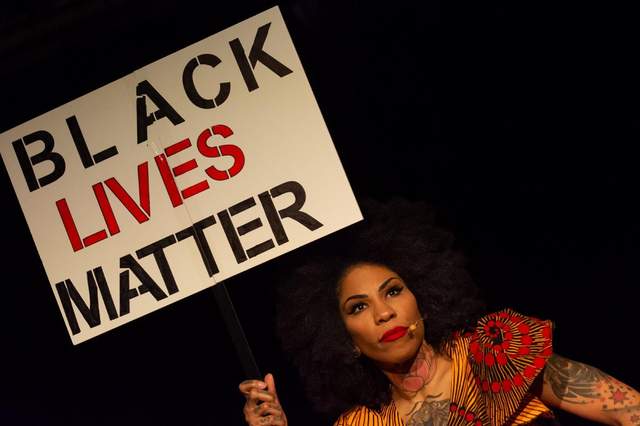
Another interesting take on the one-person show is Victoria Melody’s Head Set, which looks partly inwards (literally in this case, as she reflects on the workings of her brain, having been recently diagnosed as neurodivergent) and partly outwards at the goings on within a particular specialist community. At the beginning of the show, Victoria gives a brief summary, for those who don’t know her work, of her usual process – which is to embed herself into a world she is unfamiliar with and explore it thoroughly, often over many years, before making a show about it. In the past, she’s been a pigeon-fancier, a Northern Soul dancer, a beauty contestant, and (with the late lamented Major Tom, a handsome basset hound) a championship dog handler.
Now, she’s exploring stand-up comedy. Which she does, naturally, by adopting a stand-up comedian version of Victoria who riffs throughout the show on how hard it is to be a stand-up comedian. As is the norm in stand-up, she’s presenting carefully scripted material that gives the impression of being off-the-cuff – mixed in with actual off-the-cuff responses to the live room. So yes, as she points out herself, with a derogatory ‘fuck off’ added, what we have here is a stand-up comedy show embedded within a theatre show – meta-theatre, innit! Or perhaps it’s performance art, who knows? Whatever it is, it works brilliantly on many different levels. You could take it as a regular Edinburgh comedy show and enjoy it as that, or your could enjoy the theatrical game-playing and flagging up of the intrinsic twist at the heart of stand-up: that interplay of the real-time experience and the scripted material, all performed by someone who (like a clown) is neither a 100% real-life person nor an assumed character, but an aspect of the self.
Head Set is delivered with the wide-eyed mix of confidence and vulnerability that is typical of a Victoria Melody show. As always, her warm and welcoming stage persona puts the audience at ease, and invites them into whatever is her current world with welcoming arms. In the first half of the show, we are given a run-down of her time at stand-up comedy school, learning the craft. Her teacher is none too impressed with her material. Where’s the punchline, she repeatedly asks. This is not funny, where’s the joke? (I’m reminded of Stewart Lee’s essay on the English obsession with punchlines – apparently less important in other comedy traditions.) Victoria’s early attempts at a five-minute comedy routine are actually very funny, despite being un-formulaic. For example, there’s the one about the ducks she can’t look in the eye, because she lives on a boat and knows her pee is going into the river, but then realises the ducks are also peeing in the river. Laugh? I nearly wet myself… Later, Head Set moves on to exploring her diagnosis with ADHD, adding in another strand to the work – the strange head set she starts wearing to monitor brain activity, which inadvertently becomes the breakthrough gimmick that helps her win over audiences. But there’s an irony here: she was so, so determined not to be ‘theatrical’, to do away with sets and props and just conquer the world of stand-up with her words… Looks like theatre has cast a spell on her that she just can’ shake off. But whatever the ways and means, Head Set is a winner!
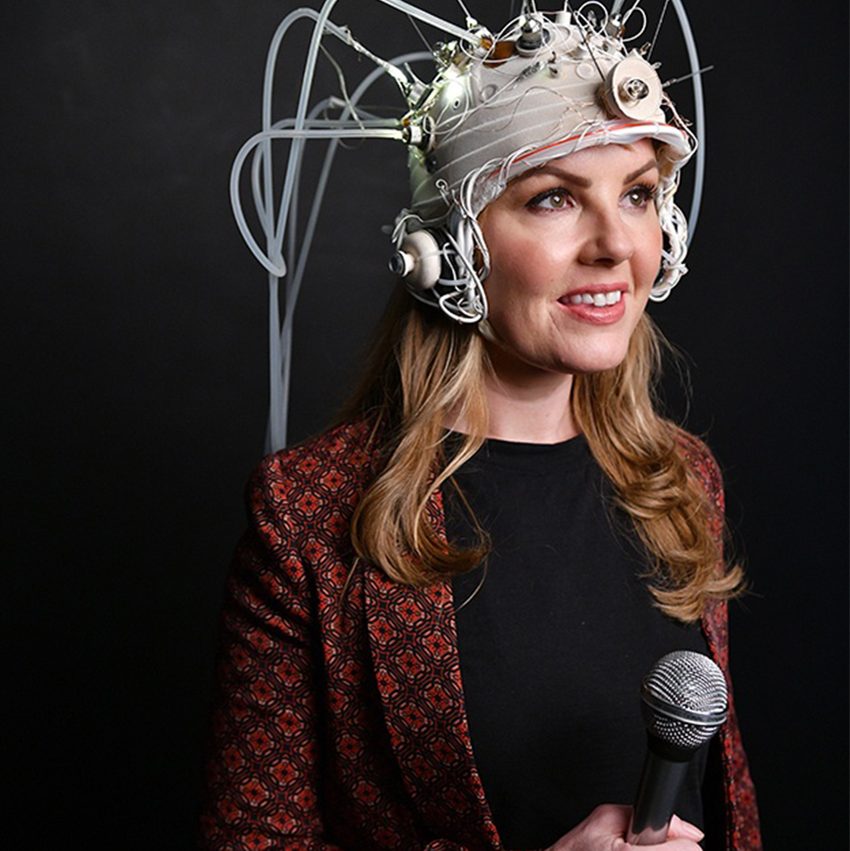
An interesting extra theatrical addition in Head Set is the inclusion of offstage/onscreen husband Mitch, filmed talking about Victoria’s failed early attempts at stand-up in front of a live audience. Including other people (on film, or referenced) in one’s autobiographical stage work brings its own set of ethical dilemmas. In this case, we assume a straightforward case of ‘permission granted’.
It’s a little more complex in Rosy Carrick’s solo show Musclebound, whose ‘also starring’ roster include an on-screen Arnold Schwarzenegger and Dolph Lundgren; Rosy’s teenage daughter Olive, referenced and quoted, but represented visually by screenshots of Courteney Cox, playing Masters of the Universe young heroine Julie Winston; and a crude faceless cloth dummy, playing Rosie’s various sexual partners, short or longterm (a ‘Guy’ we could say – penny for?). Which raises the thorny question that dogs all discussion of narrative non-fiction, be it in book form or on stage: what of other people’s ‘material’ is OK to include in ‘your’ story? I have no answer, I’m just raising the question..
Musclebound, much delayed due to the pandemic, follows on from her brilliant earlier show, Passionate Machine, This latest, similarly, has autobiographical material at its heart, and uses a creation process (not unlike that of Victoria Melody) of complete immersion in an exterior subject – in this case, the world of male bodybuilding and he-man films. Passionate Machine was also poignantly autobiographical, but there was a core to it that went beyond Rosy’s life – a quest to explore metaphysical conundrums around the nature of time and space/time travel, prompted by a visit to the CERN Large Hadron Collider, and philosophical ideas brought up by an exploration of the work of poet Mayakovsky. Musclebound is a far more self-focused and self-exposing piece, with that other roster of characters – from the mighty Arnie to her daughter Olive – all put to service to help Rosy understand her own complex sexuality, and liberate her to a point of feeling no shame in acknowledging and exploring her fantasies.
With what is undoubtedly a great deal of bravery and honesty, Rosy unpicks her longstanding sexual obsession with ‘tortured beefcake’, taking her questions right to the horse’s mouth as she travels to the USA to attend conferences and bodybuilding shows, covertly recording the questions she asks of her heroes. Arnold Schwarzenegger and Dolph Lundgren don’t really give her the answers she wants – Dolph Lundgren because he doesn’t get it at all, and in the case of the formidably intelligent Arnie, it’s probably because she isn’t really asking him the right questions. Still, she does get to have her photo taken with him.
Musclebound is built around confident verbal storytelling, taking us through Rosy’s sexual history, from early masturbatory fantasies to longterm relationships with ‘nice’ men who don’t quite cut the mustard. This is meshed with onscreen mash-ups of the aforementioned tortured beefcake, as we witness musclebound bodies stretched on racks, cut, stabbed or branded; and a relaying of encounters with boyfriends and one-night stands, played out in comic physical tussles with the squidgy, faceless dummy.
The show has a lot going for it, but needs some bedding down, so to speak, which will no doubt happen over a month-long Edinburgh run!
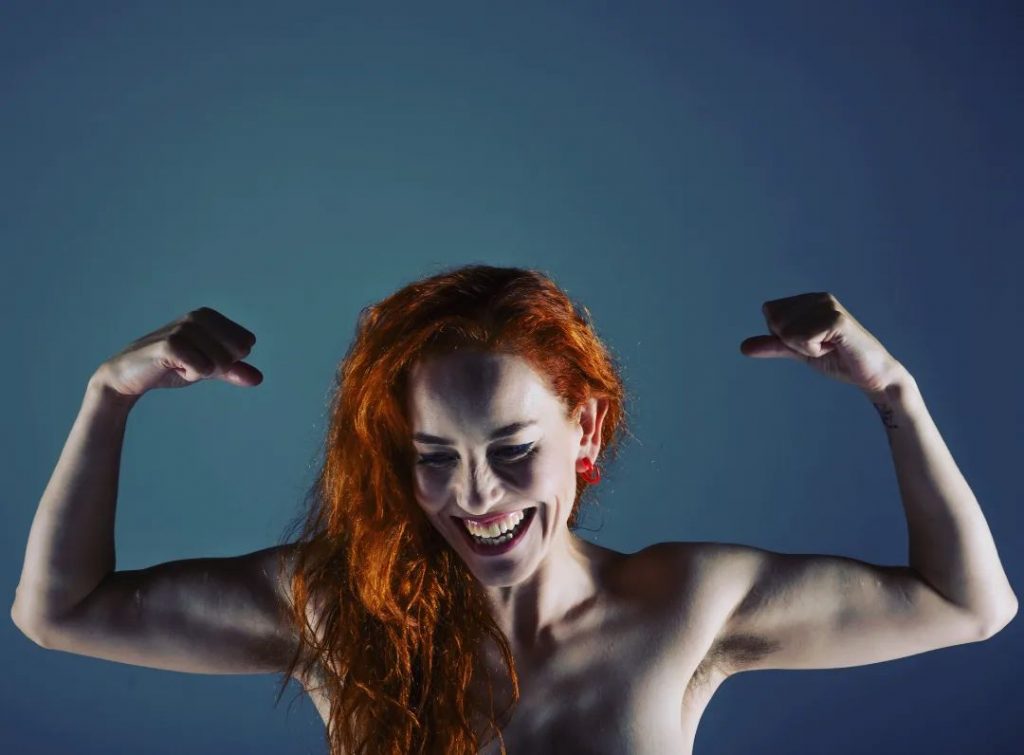
Moving on from autobiography to biography: Carly Wijs’ Boy gives us the tragic story of David Reimer. It is a story that is firmly embedded in the public domain, with numerous documentaries, TV shows, and previous plays taking him as their subject. One of a pair of identical twins, David was born male but raised as a girl following medical advice after his penis was severely injured during a botched circumcision in infancy. Later, he reverted to living as a male, eventually marrying a woman who had three children, which he raised as his own. By age 38 he was dead, having taken his own life, following the suicide of his twin brother. These are the bare facts, and I am not giving you any spoilers, as all this is given to us in the programme notes or related to us in the opening minutes of the play.
So, like a Greek tragedy, we know the outcome of the story at the start. We know that it ends badly – but we are here to learn why and how. Relieved of the tension of worrying about outcome, we can appreciate the storytelling and immerse ourself in this terrible human story.
Writer/director Carly Wijs previously brought us a similarly harrowing and terrible story in Us/Them, which took the 2004 Beslan school siege as its subject. The story of twin boys Brian and Bruce (David changed his name when he reverted back to his male identity age 15, preferring to ditch the ill-fated Bruce along with Brenda) is brought to us with compassion and a lack of judgement towards everyone involved – well, everyone other than the doctors, anyway… As with that previous work, Wijs demonstrates an outstanding ability to take a horrible true-life story and deliver it in a way that affects and moves, without assaulting or terrorising an audience.
Much of this is down to the cleverly entwined scenography and dramaturgy. No less than 900 cuddly toys are brought into service, stacked up into a massive wall to serve as both set and props. The harrowing scenes from the twins’ childhoods – the botched circumcision, the re-assignment of little boy Bruce to little girl Brenda, the childhood bullying, and the appalling psychological and sexual abuse enacted upon the children by their ‘saviour’, Dr Money – are brought to us either using the teddies as crudely manipulated puppets or through the powers of verbal storytelling.
This is all enacted beautifully by the two performers, Jeroen van der Ven and Vanja Maria Godee, who play the twins’ parents – an ordinary working-class couple who trust the authorities to know what is best for their children. The abuse of the trust this young couple put into the obnoxious Dr Money and others is another appalling aspect of this case. Both actors are excellent in their storytelling roles – completely believable in their innocence and optimism, despite the terrible circumstances.
There is an interesting switch in staging towards the end when we get to meet the real David Reimer onscreen, in an episode of the TV show Oprah on which he appeared with his mother. This perhaps to show audience members who hadn’t realised it was a true story that this was indeed the case. (The twins were born in 1965, and although initially anonymously documented by medical practitioners as the John/Joan case, David’s story exploded into the world when he went public in 1997.) The TV footage feels a slightly odd shift, but adds an interesting extra dimension.
Boy inevitably raises many issues around the topical and controversial subjects of gender, biological sex, and the question of nature versus nurture in the raising of children. Carly Wijs wisely steers clear of any judgement or viewpoint, preferring to tell the story and keep the focus on the abuse suffered by both boys by the medical experts; and on highlighting the sexism of the society that they were born and raised in.
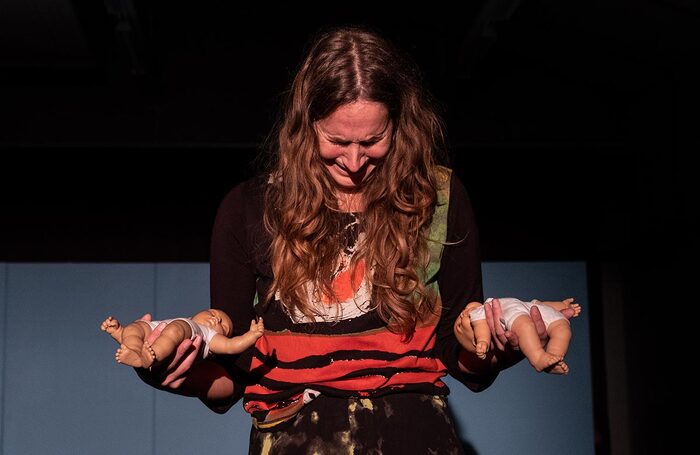
Featured image (top): Livia Kojo Alour: Black Sheep. Photo Sarah Hickson
Livia Kojo Alour: Black Sheep was seen at Assembly Rooms, 4 August 2022
Carly Wijs: Boy was seen at Summerhall, 5 August 2022
Rosy Carrick: Musclebound was seen at Assembly Roxy, 6 August 2022
Victoria Melody: Head Set was seen at Pleasance Courtyard, 8 August 2022
All shows play for the three weeks of the Edinburgh Fringe, 5–29 August 2022.
For further information and to book tickets, go to https://www.edfringe.com/

